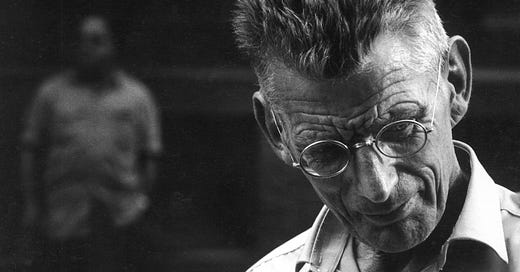Every artist is tortured by the experience of creating art, but it is also his escape from the outside world, and from worry, pain, and both company and solitude.
— John Calder
It seems self-evident to me that [Samuel] Beckett is the most significant writer of the twentieth century: he represents the culmination of the achievements of his three most important predecessors, Proust, Kafka and Joyce.
The key elements in their work, Proust’s demonstration of the elasticity of time, Kafka’s brooding sense of menace, prescient of the horrors to come in his own Germanic and Jewish world, and Joyce’s ability to blend myth with daily life through language – all find their synthesis in the literature of Beckett…
Beckett realized that life is a total accident, but whereas others considered themselves supremely lucky to be fathered by the fusion of one sperm in billions that found one egg in millions, Beckett felt the opposite.
That tiny chance of life is a supreme disaster, because even if one is born into fortunate circumstances and lives in a period of peace in a prosperous civilization, in a part of the world where such things are possible, one still has to face the lifelong certainty that one will die at the end; nothing is certain during that lifetime, nor can one know how or when one will die…




